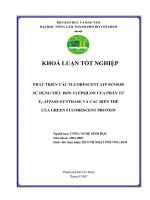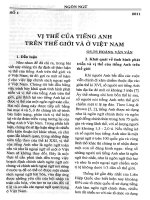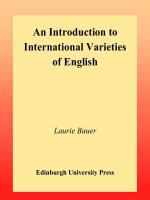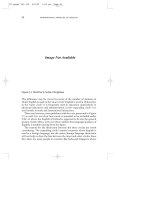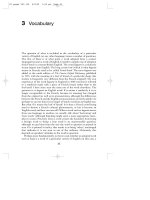Các biến thể của tiếng anh part 12 pptx
Bạn đang xem bản rút gọn của tài liệu. Xem và tải ngay bản đầy đủ của tài liệu tại đây (130.59 KB, 10 trang )
spoken language is diverging, the formal written language shows (as yet)
little evidence of such divergence. Indeed, one of the many advantages
claimed for English is that you can sit down and read a work written
in Canada or Australia or Tyneside wherever in the English-speaking
world you come from. The differences of grammar between varieties are
(as we have seen in Chapter 4) very slight. Latin as a written language
lasted virtually into the seventeenth century in Europe, and it could be
that English as a written language will outlast spoken English as an inter-
national medium of communication. Another possibility, though, is that
international communication will remain a powerful enough force to
prevent varieties of English diverging too far from each other, and thus
slow down (if not prevent) the divergent pressures.
One thing remains certain: prediction is a very uncertain business. We
can see the forces massed to cause the break-up of English, and we can
see the centripetal forces which might attempt to withstand that attack.
Precisely what the outcome will be and over what period is impossible
to predict. An overwhelming change in global politics could disrupt the
system so much that all our predictions could become invalid. But we
will not be around in 500 years to see how our predictions have fared; we
can only hope that historians of that future time will be understanding
of our inability to guess how things would turn out and why.
Exercises
1. Draw a time line showing settlement, independence and markers of
independent language (such as the first local dictionaries) for the various
colonies discussed in this book. Discuss what it shows.
2. The following is taken from a letter to the editor of the New Zealand
Listener:
The fact is that American English has evolved into a form that is different
from British English both in vocabulary and pronunciation, but which is
perfectly acceptable. There is, however, precious little New Zealand English
worth recording. Most of it is sheer misuse and mispronunciation of British
English.
Why does the writer see American English as a separate variety but New
Zealand English as a corrupt variety of British English? What would you
see as the major difference between the two? This letter appeared in
1983; what do you think this tells you about the writer?
3. Here is another letter from a local newspaper, Contact, in Wellington,
New Zealand, but some nine years later.
102 INTERNATIONAL VARIETIES OF ENGLISH
02 pages 001-136 6/8/02 1:26 pm Page 102
I’m sorry, I can’t take harassment any longer. That is to say, I cannot take it
pronounced harris-ment.
It is true that I do know some men called Harris with a twinkle in their eye.
But it has nothing to do with them.
It is pronounced appropriately enough her-assment. Almost all newsreaders
get the pronunciation of this word wrong.
Why does this letter show a contrast with the last? Why would news-
readers, of all people, be likely to use the pronunciation the writer
considers ‘wrong’? How would you answer the writer?
4. The following passage comes from the South African newspaper Mail
and Guardian (2–8 February 2001, p. 13).
Health authorities may try to curtail or even outlaw the annual Swazi
bacchanal that commences with the arrival of buganu, the traditional brew
fermented from the fruit of the maganu tree.
But even in the light of a cholera outbreak that may be worsened by a
brew made from tainted water, the summertime overindulgence that inspires
legendary public sexual escapades is not likely to be inhibited.
‘Nobody is going to stop the buganu from flowing,’ says Sipho Matsebula, a
bus conductor whose shoulders bulk up at this time of year as he hefts large
drums of the country brew to the tops of long-haul buses for delivery to urban
centres, including Johannesburg.
What makes this a South African text? Can you distinguish between
the setting that the text discusses and the language in which the text is
written? How would you have to change this text to avoid it being a
South African text?
Recommendations for reading
On the split of English, McArthur (1998) makes very interesting reading.
For a contrasting view, see Quirk (1985).
BECOMING INDEPENDENT 103
02 pages 001-136 6/8/02 1:26 pm Page 103
9 Standards in the colonies
Wherever we go in the world, we find a number of different varieties of
English, the features of which are not determined by whether we are in
Canada or Australia but by how formally we are writing or talking and
by who we are. An invented sentence like that in (1) could in principle
arise in most places in the English-speaking world, with exactly the same
features. It is not regional, but it shows a kind of variation which occurs
within all the regional varieties.
(1) This man come into the bar last night and he said all them things are
wrong.
So far we have been making the pretence that there is just one level of
language, both in Britain and in the colonies, a level which we can
term a standard. It is the standard variety which is codified in the works
discussed in Chapter 8. But as well as variation in the standard from
country to country, there is variation away from the standard in each of
the countries. The problem is to distinguish the two.
9.1 Moving away from the standard in vocabulary
The obvious examples of non-standard words are swear-words and other
instances of ‘bad language’. The most taboo of these words rarely make
it into print in newspapers and magazines, though may appear in fiction,
drama and poetry. But there is also another level of language which is not
subject to taboos, and yet is still not regarded as ‘good English’. Some
expressions in this category, such as stuff up ‘to make a mistake’ are
recently taboo words, but others such as duff up ‘beat up’ are not. Such
words are usually termed slang words. We cannot predict whether slang
is regionally restricted: some is, some is not. In a recent research pro-
gramme in which eleven- and twelve-year-old New Zealand children
were asked about the words they used to describe various things, we were
given 168 different ways of saying that somebody told you off. These
104
02 pages 001-136 6/8/02 1:26 pm Page 104
included all the expressions in Figure 9.1. Of these, we know that growl
somebody is a local New Zealand expression, but we suspect that all the
others can be found elsewhere. Unfortunately, this can be hard to prove,
partly because slang words can be very ephemeral, and partly because
many dictionaries do not include a lot of these slang words and ex-
pressions, and it can be difficult to discover how widespread they really
are. The other side of the coin is provided by the words in Figure 9.2
from Munro (1997). These are slang words from California university
students which still sound unfamiliar to me, and are thus probably
locally American. (I could, of course, be wrong.)
As well as obvious slang terms, there are words which are used in
particular registers only (such as when talking to children – words like
tootsies for ‘feet’) which could be seen as non-standard but not necess-
arily regionalised words.
9.2 Moving away from the standard in grammar
There are a large number of features which are found in many inter-
national varieties of English and which are probably not viewed as
completely standard in any of them. Some examples are provided below.
What is interesting about these features is not whether they exist or not,
but when and where they are used: are they restricted to conversation
STANDARDS IN THE COLONIES 105
growled me threw/chucked/had/packed a spaz at me
bit/blew my head off threw/went/had a psych at me
fell out of his tree threw a (hissy) fit at me
freaked out wasted me
gave me a blasting went ape at me
greened out at me went ape-o/hyp-o/spaz-o
lost his chill pills went ballistic
packed/had/threw a fit at me went mental at me
slagged me off went off his block
stressed out at me went shitty at me
Figure 9.1 New Zealand expressions for ‘told me off’
bomb-ass really good dog on (a person) make fun of
bootie ugly, repulsive earl to vomit
buff very muscular flip a bitch do a U-turn
crispy pretentious gleek spit copiously
diesel tough hooride car
Figure 9.2 Some American slang expressions from Munro (1997)
02 pages 001-136 6/8/02 1:26 pm Page 105
or are they used in formal speeches, in courts of law and in formal
broadcasts?
A typical case is provided by invariable there’s. Standard usage every-
where permits the pattern seen in (2) with there is for a single object and
there are for several.
(2) There is a strange dog in the garden.
There are some strange dogs in the garden.
However, there’s is commonly used in both situations, especially in
spoken English, but also in written English. Evans and Evans (1957),
Peters (1995), Burchfield (1996) and Fee and McAlpine (1997) all imply
that this is an informal construction, though the precise relationship
between informal and non-standard is not clear.
Another is the use of never as a simple negator. In the standard English
of England, there is a distinction to be made between (3) and (4).
(3) I didn’t see John F. Kennedy trip.
(4) I never saw John F. Kennedy trip.
(3) refers to a single occasion, while (4) is a general statement more or
less equivalent to ‘on all the occasions on which I saw John F. Kennedy, I
did not see him trip’. However, in Scottish English, never is used perfectly
naturally to negate the single event, so that (4) can mean the same thing
as (3) and we can hear things like
(5) I never watched Friends yesterday.
This same usage is found in Falkland Island English (Sudbury 2001: 73),
New Zealand English, and South African English (Branford 1994: 491),
and in other varieties as well, including North American ones. It is
used in more formal contexts in Scotland than in these other varieties.
Burchfield (1996) notes this usage but does not condemn it; Peters (1995)
and Fee and McAlpine (1997) do not even mention it; this may suggest
that it is on the way to being considered standard everywhere.
Another example which may have its origins in Scottish English is the
use of may for might. A news broadcast on Radio New Zealand’s pres-
tigious National Radio in 1990 announced
(6) Some of the road deaths in the Auckland area may have been
prevented if more staff had been available.
The road deaths had not been avoided. This construction is found in
British English and in US English, but is clearly non-standard in both.
In Australian (Newbrook 2001: 122) and New Zealand English the con-
106 INTERNATIONAL VARIETIES OF ENGLISH
02 pages 001-136 6/8/02 1:26 pm Page 106
struction is rare, but less obviously non-standard in that it is used in the
press and broadcasting quite freely.
There are some non-standard tags, too. In Australian, New Zealand
and Falkland Islands English, but is found used as a tag, as in (7) (Turner
1994: 303, Sudbury 2001: 73).
(7) Funny old bag. I quite like her but.
There are two noun phrase constructions whose degree of standardness
is changing rapidly at the present time. The first is usually illustrated
with the phrase between you and I. The rule for English used to be that you
used you and I in the places where you would use I alone, and you and me
in the places where you would use me alone. Thus You and I know better
(because it is I know better not *Me know better), He showed it to you and me
(because it is He showed it to me, not *He showed it to I ) and They saw you and
me last night (because it is They saw me, not *They saw I ). The problem
started when people used me and him (and other similar forms) in subject
position: Me and him were late. Such utterances were corrected so often to
forms with I, that the point of the correction was lost, and people began
to believe that only I and never me could occur in co-ordinated phrases.
My experience is that undergraduate students now believe that He saw
you and I is better or more formal English than He saw you and me, and this
observation is supported by Collins (1989: 146) for Australian English.
This is an unexpected off-shoot of overt prescription. Meanwhile, there
are still people (like me) who work with the old system, but even we
are becoming contaminated by modern usage. This kind of variation is
found everywhere that English is spoken as a native language, and it
seems likely that in another fifty years or so the between you and I people
will win out completely.
Another distinction that is disappearing in noun phrases is that
between less and fewer. The difference used to be one of countability,
parallel to the difference between much and many (see Quirk et al. 1985:
245–52). So where you could say Much bread/knowledge/water you could
also say Less bread/knowledge/water, but where many was required as in
Many books/loaves/people (not *Much books/loaves/people) you had also to
use fewer. For many speakers today, however, Less books/loaves/people is just
as ordinary as the traditional Fewer books/loaves/people. A few years ago,
a poster advertising a local radio station with the slogan ‘More music,
less commercials’ was defaced by a literate graffiti artist with the words
‘Fewer grammar’. In another few years, it seems unlikely that anyone will
recognise a problem here. The same failure to maintain a count/non-
count distinction is giving rise to the increasingly common phrase a large
amount of people. Since people are countable (we can have many people but
STANDARDS IN THE COLONIES 107
02 pages 001-136 6/8/02 1:26 pm Page 107
not *much people), traditionalists require a large number of people: amount of
goes with the nouns that use much. Again, what was non-standard is
becoming standard.
In some cases, like the between you and I one, self-appointed guardians
of the language leap to prop up some usage which is going out of fashion
and to decry an incoming usage. One such case is what you do with the
adjective different. Which of the following is correct?
(8) It is different to what I’d expected.
It is different from what I’d expected.
It is different than what I’d expected.
You will probably find that you have quite firm ideas about which is
‘correct’, even if it is not the one you yourself use. These ideas are
implanted by the prescriptions from the language guardians. There are
arguments in favour of each of these, but they are spurious arguments.
But because there is overt prescription, not only do we find people aware
of the variation, we also find that prescriptions can differ from place to
place. Different to is virtually unknown in the USA, but different than is
much more common in formal writing in the USA than elsewhere
(Hundt 1998: 105–8). Different to is found in Britain, in Australia and New
Zealand mainly in informal contexts, while different from is the preferred
formal version everywhere.
The examples given here are simply examples of a wider phenom-
enon – and, indeed, it might be argued that some of the grammatical
features treated in Chapter 4 would have been better mentioned here
instead. In all of these instances, a greater or lesser amount of variation
may be tolerated in different varieties and the variation may be seen as
closer to or further from the standard ideal. This makes the notion of
standard very difficult to define: when I hear a Prime Minister of New
Zealand saying in a broadcast interview
(9) It would have been better for New Zealand if the money had have
been thrown off the Auckland Harbour Bridge.
is that a sign that the construction with had have (often written had of ) has
become standard in New Zealand English, or not, and how should I be
able to determine this?
9.3 Moving away from the standard in pronunciation
People seem to have a fairly good picture of what a standard accent
sounds like, and any divergence from that is seen as a move away from
the standard. In particular, this applies to the use of rhoticity in Britain
108 INTERNATIONAL VARIETIES OF ENGLISH
02 pages 001-136 6/8/02 1:26 pm Page 108
(and New Zealand) and to the lack of rhoticity in the USA, but it also
applies to a host of quite minor differences such as quite slight differ-
ences in vowel quality (this is particularly true for the
STRUT vowel and
the
GOAT vowel in British English). In addition there are a number
of phenomena which mark a non-standard accent in most varieties of
English.
• /h/-dropping: pronunciations such as /
aυs/ for house. (Note that
/h/-dropping on unstressed words such as him in sentences like Give
him a biscuit is perceived as being standard.)
• So-called <g>-dropping (although phonetically there is no [
] to be
dropped): pronunciations such as /
kmn/ for coming.
• The use of a final /k/ in words ending in -thing giving pronunciations
such as /
smθŋk/.
• Loss of or reduction in use of /
θ/ and /ð/. The situation with these
sounds is complex and we do not need a detailed picture here. The
fricative /
θ/ in all positions and /ð/ in medial and final positions
alternate with /
f/ and /v/ respectively in urban British accents,
under the influence of London (Cockney) English. This gives
pronunciations like [
fŋk] for think and [brvə] for brother. Such
pronunciations are now occasionally heard in Australia and New
Zealand. At the same time, /
θ/ and /ð/ in all positions may be
replaced by /
t/ and /d/ respectively, under the influence of Hiberno-
English and also older London English. This gives pronunciations like
[
tŋk] for think and [ds] for this. These are heard not only in Ireland
and Liverpool, but also in some regional accents in the USA.
• Extensive use of a glottal stop either intervocalically or word finally:
pronunciations like [
bʔə] for butter and [kʔ] for cat. (A certain
amount of glottal use is compatible with standard status, as long as
it is not intervocalic as in butter. In some varieties a tap is heard in
such environments instead, giving [
bɾə], and this may be considered
standard, for example in Canada, the USA, Australia and New
Zealand.)
Australian, New Zealand and South African varieties of English face
another problem. Although each of these varieties is different from the
others and different from Cockney, they all share certain pronunciation
features with Cockney (probably because all four accents were caused
by mixing other accents of relatively similar sorts). In a British context,
Cockney is in some senses the non-standard accent par excellence: it is
an accent of the capital city, and thus has no regional ‘excuse’ for being
different from the prestige accent RP, it is simply a non-standard variety.
In the colonial situation, accents which are reminiscent of Cockney have
STANDARDS IN THE COLONIES 109
02 pages 001-136 6/8/02 1:26 pm Page 109
been tarred with the same brush. The opprobrium which is heaped upon
Cockney (it is said, very unfairly, to be lazy, slovenly, ugly and so on) has
been transferred to the colonial accents, in a way which has proved very
difficult to avoid. As a result, these accents have been perceived as being
non-standard accents of a foreign English and as we saw in Chapter 8 it
is only recently that laypeople have started to perceive that there are
standard and non-standard varieties of these colonial Englishes.
9.4 Discussion
There are two general points which arise from the material discussed
here, one about the nature of standard in general, the other about the
nature of what is non-standard.
Despite all the codification discussed in Chapter 7, it is not necessarily
easy to say what is or is not standard in any particular variety of English.
An extreme position might be that colonial varieties are, by their very
nature, not standard varieties and that there is only one standard English,
namely the standard English of southern England. An only slightly less
extreme version of this would allow two standard forms, a British and
a North American standard. This is the way in which Australian, New
Zealand and South African Englishes have been viewed for a long time,
although as we saw in Chapter 8 this is now changing.
If we wish to reject this extreme view, then we have to ask what it
is that makes a particular variety of English standard in its own com-
munity. This usually involves factors such as being a variety used in
formal broadcasting, a variety used in the judicial system, a variety used
in higher education, sometimes a variety used in government and the
church. The difficulty with such a definition is that when you actually
examine the types of English used in these different environments,
you discover that there is a great deal of variation within them. This then
gives rise to another question: how much variation (if any) is ideally
permissible within a standard variety? Such a question is not readily
answerable, because it is not easily quantified. But what we can say is
that standard varieties typically allow less variation than non-standard
varieties (Milroy and Milroy 1985). Less variation is still not the same as
no variation. Consider the variants in (10), for example, any one of which
might be considered standard, though the first is now old-fashioned and
if used at all is extremely formal.
(10) The economist whom I met in Paris was a German.
The economist who I met in Paris was a German.
The economist that I met in Paris was a German.
The economist I met in Paris was a German.
110 INTERNATIONAL VARIETIES OF ENGLISH
02 pages 001-136 6/8/02 1:26 pm Page 110
Even in the best-codified varieties, therefore, we are still left with
problems of demarcation of the standard. For most purposes, it must
be admitted, this does not matter at all. But if we want to talk about a
standard Falkland Islands English or South African English, for example,
we will need to know what that entails in order to delimit it successfully.
The second point is the nature of what is non-standard. In a place
like Britain we can more or less equate regional with non-standard. For
example, the term mash of tea is regionally limited and non-standard.
The converse is not true: things which are non-standard are not necess-
arily narrowly regional. Consider rhoticity in Britain, which is found
in over half of the British mainland – and probably in more than half
of England (though not in the most prestigious accents), and is still
not considered standard there. Cheshire et al. (1989) list a number of
grammatical factors recognised by at least 85 per cent of their urban
respondent schools, and these include:
• demonstrative them: Look at them big spiders.
• should of: You should of left half an hour ago.
• never as a past tense negator: No, I never broke that.
• there was with a plural: There was some singers here.
The fact that these are so widely recognised suggests that they are not
narrow regionalisms, yet these are not standard forms. Other things like
double negatives (We don’t have no money) and adverbial use of adjectival
forms (He ran real quick) have been suggested as factors which are more
likely to be generally non-standard than markers of regionality
(Cheshire et al. 1989: 194) – and while these two do show some regional
variability within Britain, they are both widely found in colonial
Englishes as well.
Once we start to consider colonial Englishes, we can no longer make
the assumption that a narrowly regional form must be non-standard.
This is perhaps most obvious with vocabulary items: very few people
outside New Zealand are likely to know the words boomer and borer, but
while boomer (‘a whopper’) is (dated) slang and rarely used in print, borer
is an absolutely normal term for ‘woodworm’. The same point is true,
however, of features of grammar and pronunciation. The form proven
is probably standard in Scotland and the USA, non-standard in England,
and of rather uncertain status in Australia and New Zealand. It is these
marginal status items which are hardest to judge. Although Australia and
New Zealand tend to follow English norms for many things, it would be
hard to say that an Australian or New Zealander who used proven was not
speaking a standard variety of their English, if this were the only pointer.
As such features become more widely used, they are more likely to
STANDARDS IN THE COLONIES 111
02 pages 001-136 6/8/02 1:26 pm Page 111
